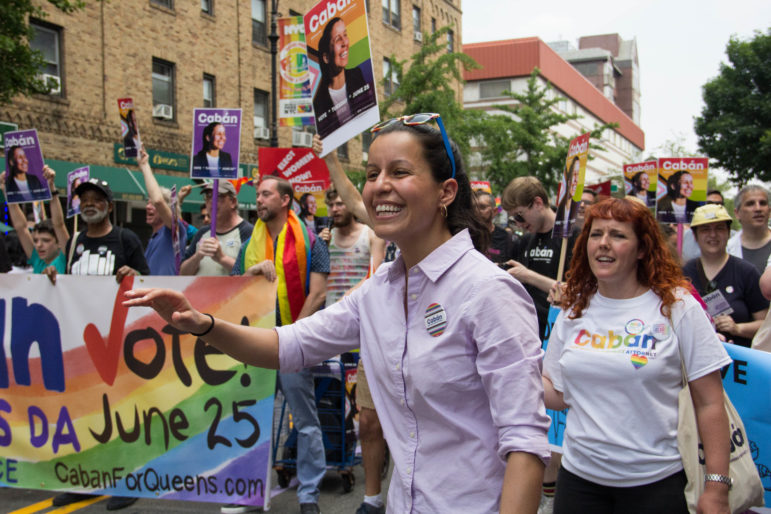
Nicole Millman
Tiffany Caban, Democrat for Queens district attorney, at the Queens pride parade.
When They See Us, Ava DuVernay’s series on the five black and brown boys who were coerced into giving false confessions in the Central Park jogger rape case, shines a floodlight on how prosecutors have denied the rights of defendants within a racist criminal justice system.
The discussions around this deeply painful chapter in New York City history have seized social media as the Queens District Attorney primary enters its final stretch. Who wins the Democratic nomination next Tuesday is the all-but-assured winner of the general election in November.
Under decades of pressure by leaders and groups organizing for reform, DA offices across the city are trying to leap forward in undoing the injustices they have perpetrated. In those changing tides, the Queens DA’s Office, steered for nearly 30 years by the late Richard Brown, has stood largely still and resistant.
In 2014, the New York Court of Appeals ruled in People v. Dunbar that the Queens District Attorney Office’s interrogation program violated the Fifth Amendment of the Constitution, which guarantees the right against self-incrimination.
As the Brennan Center for Justice described at the time: “Prosecutors would take suspects waiting for public defenders in for questioning and read them a script. The script contained misleading implications that the suspect would have no other opportunity to explain their side of the story to prosecutors, encouraging them to make “Hail Mary” statements that would later be used against them in trial.”
Last year, Brown’s counterparts in Brooklyn and Manhattan announced that they would stop prosecuting most marijuana possession and smoking charges. The Queens DA remained unmoved despite a call by Queens leaders to do the same.
Names like Manuel Mayi and Sean Bell may generate question marks for people who are becoming New Yorkers. But many of us remember how the Queens DA failed to hold anyone accountable for the deaths of these two young men. Mayi in 1991 was chased by a white mob for 14 blocks before they sprayed him with a fire extinguisher, beat him and left him with a fractured skull. In 2006, Bell was with friends in a car that police fired at — 50 times. They were unarmed. Bell was killed on what was supposed to be his wedding day. The quality of the prosecution of those cases came under fire from community leaders and the victims’ families, including Valerie Bell, Sean’s mother.
There is no question that the Queens DA’s office is overdue for an overhaul. Gregory Lasak, one of the candidates bidding for the seat, is not the one to bring it.
During a June 11th candidates debate on New York 1, Lasak, a retired Queens Supreme Court justice, talked about how he helped exonerate several wrongfully convicted men. This is, of course, commendable. But he also said a review of the cases prosecuted by the Manhattan DA under the watch of Linda Fairstein, the prosecutor in the Central Park jogger case, would be “a little rash.”
Exhibiting a tough but merciful interest in addressing “mistakes” in cases is not the same as being able to articulate a deep understanding of how racism permeates criminal justice. And the not so coded messaging around Lasak – that Queens will regress without the experienced but reasonable law-and-order types – is the moldy, expired bread of criminal justice thinking.
Lasak has the backing of several police unions, hardly champions of fundamental change. Queens electeds like State Senator John Liu, who is backing Melinda Katz, see Lasak as Brown 2.0. “And he doesn’t run away from that,” Liu said.
There were seven candidates, including Lasak, running in the Democratic primary for Queens DA but one, Councilman Rory Lancman, has just dropped out. Out of the six remaining, four are women and four are people of color. Most of the six are emphasizing their progressive credentials. All are longtime residents of what is the most diverse county in the nation.
Mina Malik, Jose Nieves, Betty Lugo and Tiffany Cabán all have impressive experience. Malik’s background includes serving as head of the Civilian Complaint Review Board. Jose Nieves was Deputy Chief in the Special Investigations and Prosecutions Unit of the New York Attorney General’s Office. Cabán’s experience is as a public defender at the New York County Defender Services and Legal Aid. Lugo worked at the Manhattan DA’s and has had her own practice for years.
But with the exception of Cabán, all have been challenged with building energetic campaigns.
Another contender is Queens Borough President Katz, who has been in three different elected offices over 20 years. Katz is positioning her management experience and counting on support from the Democratic Party machine.
But Katz – who will soon be termed out of Queens Borough Hall — has never worked as a prosecutor or public defender. It’s hard to imagine candidates of color without that experience easily receiving the same kind of legroom.
Cabán has worked with hundreds of indigent clients, yet the Queens Bar Association somehow considered her –only her— unqualified to run. How two candidates who have never tried a case in criminal court wind up with approval ratings and yet one who has handled these cases is rejected reeks of fear of change. (The New York City Bar Association found all of the Queens DA candidates qualified, including Cabán.)
Get the best of City Limits news in your inbox.
Select any of our free weekly newsletters and stay informed on the latest policy-focused, independent news.
The prospect of a public defender running a DA’s office breaks the tradition of prosecutors steering that ship. It’s one that Jackson Heights activist and lawyer Shekar Krishnan find compelling in Cabán, the only public defender running in this race.
Krishan says that Cabán’s lived experience – working to defend black and brown people in court— is critical for transforming the DA’s office. “Having someone who understands what that means…is the most important qualification, particularly if we are going to undo the regressive policies of the Queens DA’s office,” Krishnan said. “The change that is needed, given how behind the DA’s office is, is with someone who is going to radically transform it.”
Some are reducing the Queens DA race to a battle between the Democratic versus progressive machines. Krishnan is clear that this is about a movement.
It’s a movement that stretches far beyond the borough. Larry Krasner, a former civil rights attorney campaigned and won as a progressive prosecutor in Philadelphia. He’s currently leading efforts to reform mass supervision. “What happens is, there’s a period of time when the supervision for some people is useful and is a good thing,” Krasner is quoted in Philadelphia Inquirer. “But after that, it just becomes a bunch of tripwires that very few of us could ever keep dancing over.”
Krasner and others around the country who are running on reimagining prosecutorial offices have been backed by the REAL Justice PAC, which is propelled by former Bernie Sanders campaign staffers and activists.
Dianne Morales, an educator and community advocate, donated to Cabán’s campaign and has heard her speak. “There is a rising wave against traditional elected officials and we are moving towards increasing representation of what communities look like,” Morales said. “Having someone who has both lived and professional experience in that context is powerful.”
Queens residents and community leaders like Jessica Gonzalez-Rojas are excited about Cabán because she brings a perspective that hasn’t been at the very front of the Queens DA’s office, a perspective grounded in defending poor clients, tenants at the mercy of abusive landlords and scammed immigrants and other vulnerable workers. “She gets what it like to struggle,” said Gonzalez-Rojas about Cabán’s upbringing and work. “She’s not a career politician.”
Turnout is a wildcard on primary day next Tuesday.
With Brown at the helm for decades, the DA’s race hasn’t been in the orbit of voters. New York recently moved primaries from September to June, another adjustment and challenge.
A low turnout could be an advantage to Katz, who has name recognition and is banking on a long list of heavy-hitting endorsers, especially from strong voting blocks like Southeast Queens. “She always comes with Comrie,” said one older woman dining at a Jamaica Avenue food court. She was referring to State Senator Leroy Comrie, who is backing Katz.
At the same time, campaign experts like Will Sweeney say that more conservative areas of Queens that might have backed Katz had the field been smaller are likely to go with Lasak.
Prime voters are expected to show up as they usually do, and name recognition will be big, but so will the candidate Queens residents feel motivated and mobilized by. “Insurgents benefit from a higher turnout,” Sweeney said. “People show up for change.” So if the Cabán campaign is able to pull more voters out, she has a strong shot at winning.
Lancman is now backing Katz and it remains to be seen what impact that will have. What is clear now is that Queens County leaders are nervous and that Lancman will have to explain his criticism of Katz. As journalist Ben Max noted, Lancman had challenged Katz for not sponsoring a single bill in the City Council, as borough presidents have the right to do, on criminal justice reform, or speaking about reform in her state of the borough addresses.
For years, Queens has been in the backseat of criminal justice reform. It now has a chance to be a leader with someone like Cabán who is fully invested in re-imagining this office, instead of treating it as another notch or landing pad.
Erica González, a member of the City Limits board of trustees, is the former director of public technology and senior adviser at the New York City Council. She is also a former executive editor of El Diario/La Prensa.



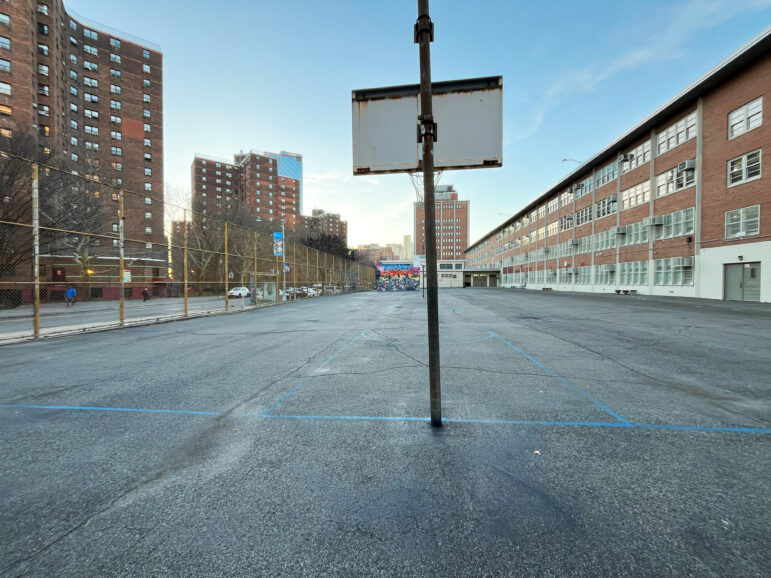
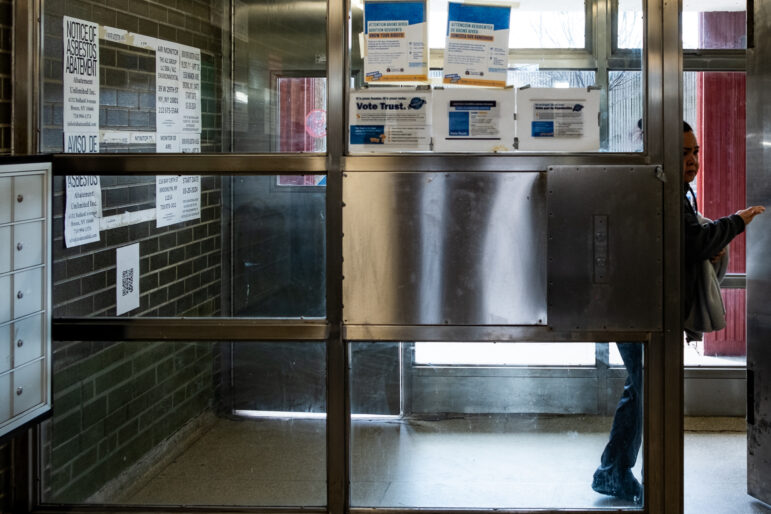
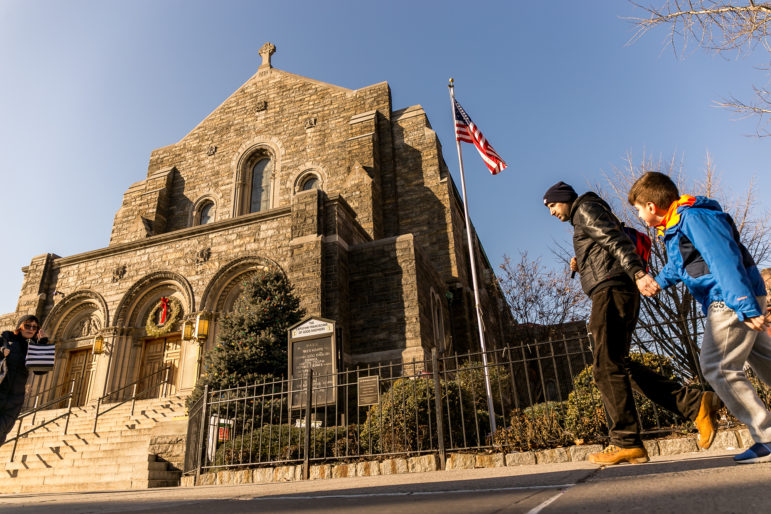
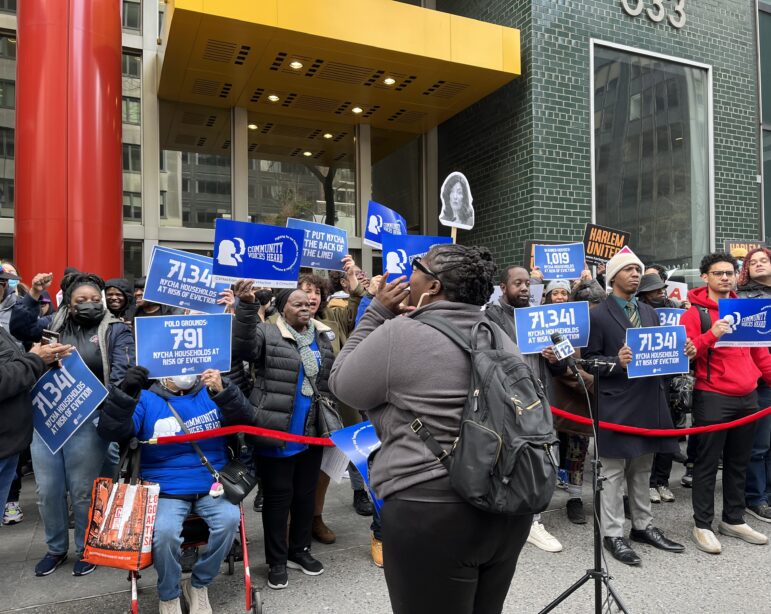


2 thoughts on “Opinion: Queens DA Primary is a Chance for Truly Bold Change”
I was going to vote for Lancman. He was, I thought, reform minded. That he would endorse Katz is more disappointing than that he dropped out at the last second.
I am really uncertain about Caban. I am concerned that the bureaucracy of Boro Hall will eat her up. I am not entirely convinced that an office meant to prosecute should be run by a defense attorney. But she is better than the party hack Katz, and far better than the DINO Lasak. Guess I am voting for Caban after all.
Some please tell Caban that the DA’s job is to prosecute criminals.